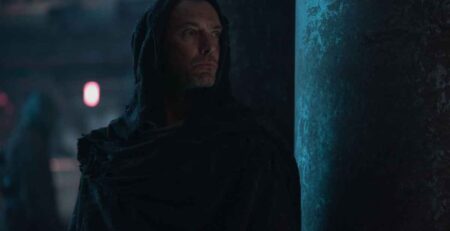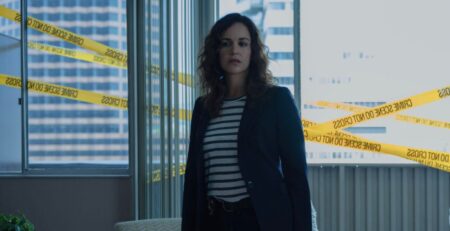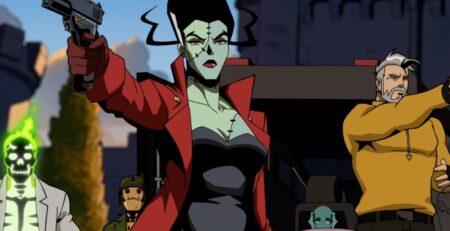Love Life Season 1, a new romantic comedy on HBO Max created by Sam Boyd, is an episodic take on dating in your twenties in New York City. The show follows Darby Carter (Anna Kendrick), beginning in her early twenties in 2012 as she navigates love and life across the decade. The show’s ten episodes each follow a different relationship as Darby grows, learning about herself and her love. The show is narrated, and Lesley Manville frames each episode. Should the show return for subsequent seasons, each season will follow a new protagonist as they journey from first loves to their last.
On the whole, the first three episodes of Love Life are a solid representation of a certain kind of stereotypical love life. In the first episode, Darby is fresh out of college at NYU and has her first serious romantic entanglement with the 80 percent charming, 20 percent awkward Auggie Jeong (Jim Ha). She falls in love way too fast and nearly plummets into a long-distance relationship by the end, but their relationship is sweet and not just superficial. In the second episode, Darby gets into a relationship with her ex-boss Bradly (Scoot McNairy) who is recently divorced, rich, and ultimately way too old for her. By episode three, several years after her relationship with Auggie, Darby finds empowerment in a one-night stand with the commercially named Danny Two-Phones (Gus Halper).
The relationships so far are certainly not disintegrating, and it would be unfair to call them bland, but the scenarios just feel trite. Romantic comedy is a genre built on tropes, so its not the familiarity of the scenarios that feels lukewarm. It’s just that Love Life, at least so far, doesn’t feel like it is doing anything new with the relationships. Granted, what the show does offer is itself entirely satisfying. The acting is quite impactful and despite none of the actors looking or acting quite like early twenty-somethings, most of them play their parts very well.
What makes Love Life hold up as a show with the potential to feel fresh as its next seven episodes unfold is the clear emphasis on Darby’s growth as her own person. While the gimmick of the show is that each episode is a new relationship, it isn’t a show about how other people mold her into the person she dramatic irony shows off at the very end of episode one. Love Life seems to be a show about how Darby learns to take the reigns of her own life independent of the men that are part of it as she overcomes the traumas of her upbringing and the way romance and love were grafted onto her by her parents. This distinction shapes the show to be one of self-empowerment rather than one where she’s saved by the graceful arms of a swooning man. Which is not to say there aren’t swooning men that come in and out of Darby’s life.
The relationships she has, while the begin, go on, and end in virtually exactly the ways you would expect them to, the subtle but deep psychology and growth in Darby through these relationships is important. In particular, Darby has a complex, like so many people with relationship trauma, where she has an incessant need to fix her partners or pretend things are okay when they’re not. And while these aspects of Darby’s psyche are not explicitly discussed, they make her especially relatable to me, having once been in an abusive relationship. While I’m certainly glad for Darby that her dispositions have yet to lead to any further traumatic experiences, I do worry that she is bound for something potentially worse than just heartbreak in an upcoming relationship.
Yet, I shouldn’t be rooting for the main character to have something bad for her to keep me engaged in the show. The first three episodes are good, but I cannot imagine being sustained by this same level of steady predictability. If there was something about the show that helped it stand out, anything at all, its tropes wouldn’t be bothersome. Early in the first episode, somebody is mockingly referred to as looking like Zooey Deschanel. Even though it’s just a topical 2012 reference and probably a jab at how Anna Kendrick sort of looks like her, I can’t help but compare Love Life to Deschanel’s excellent romantic comedy show New Girl. New Girl might be built on all the same genre tropes as Love Life, but at least New Girl has a hilarious and creative cast and premise to build on.
The love interests in Love Life are all excellently acted and portrayed, but the other folks in Darby’s life, not quite as much so. Zoë Chao as Darby’s best friend and roommate Sara is likable but fairly one-tone. Sara’s long-time partner Jim (Peter Vack) is also likable enough, not being portrayed as the typical annoying, dumb boyfriend who you’re not supposed to like. But if Sara is a one-tone, Jim is a half a tone. Though to be fair, I last saw him playing a hot dancer who escaped a reality TV set and played foil to Gael Garcia Bernal on Mozart in the Jungle, so my perspective on him is a bit tainted. However, if Jim is a half-tone character, their third roommate Mallory (Sasha Compère) is a quarter-tone at best.
In a show with only two non-white characters so far, Mallory and Auggie, Mallory’s underutilization is painfully unfortunate. Billed as a main character, she plays little role other than to argue with Sara and never winning and offering advice to Darby that she doesn’t take. The lack of characters of color and the measly role that one of the only two have played so far just adds to the blandness of Love Life overall.
Ultimately, Love Life Season 1 offer an entertaining, well-acted, sometimes emotionally gripping romantic comedy with plenty of potential in both the season and the concept overall. However, its trite plots and relatable scenarios are not balanced with anything creative or original enough to help it reach a status beyond simply good destruction from real-life emotional baggage. At least, not yet.
Love Life Season 1 is streaming exclusively on MAX (formerly HBO Max).
Love Life Episodes 1-3
-
Rating - 7/107/10
TL;DR
Love Life’s first three episodes offer an entertaining, well-acted, sometimes emotionally gripping romantic comedy with plenty of potential in both the season and the concept overall. However, its trite plots and relatable scenarios are not balanced with anything creative or original enough to help it reach a status beyond simply a good destruction from real-life emotional baggage. At least, not yet.





